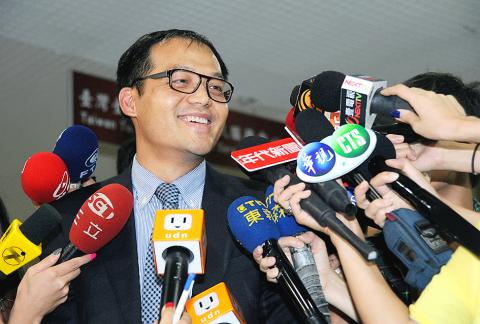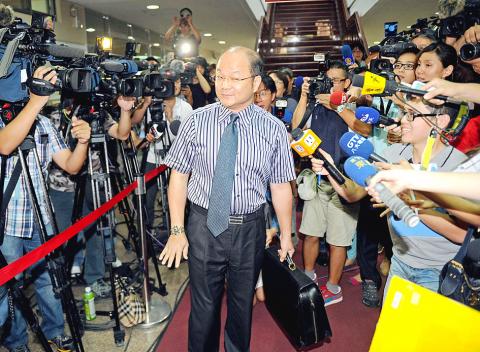|
Wang takes KMT to
court over membership ruling
SPEAKER: Wang Jin-pyng said he hopes to retain
his seat to resolve a series of issues that are vital to political and social
stability, eg, the budget and service trade pact
By Chris Wang and Shih Hsiu-chuan / Staff reporters

Lawyer Hsu Ying-chieh,
representing Legislative Speaker Wang Jin-pyng, speaks to the press at the
Taipei District Court yesterday after a court session to review Wang’s challenge
of a Chinese Nationalist Party (KMT) decision to revoke his party membership.
Photo: Liu Hsin-de, Taipei Times

Lawyer Chen Ming, center, appears
at the Taipei District Court yesterday to represent the Chinese Nationalist
Party (KMT) against Legislative Speaker Wang Jin-pyng following the revocation
of his party membership.
Photo: CNA
Facing accusations of influence peddling,
Legislative Speaker Wang Jin-pyng (王金平) yesterday took his battle with the
Chinese Nationalist Party (KMT) and President Ma Ying-jeou (馬英九) to the Taipei
District Court in the hope of retaining his KMT membership and legislative
speaker position.
The court held its first session yesterday afternoon to review Wang’s challenge
of a KMT decision, which revoked the 72-year-old politician’s membership in the
party for his role in alleged illegal lobbying.
The court did not hand down a ruling yesterday. According to the Code of Civil
Procedure (民事訴訟法), the court should make a ruling within seven days of a
provisional injunction.
Wang and Ma did not attend the court session.
Former Democratic Progressive Party legislator and attorney Chiu Tai-san (邱太三),
who represented Wang, filed an injunction against the revocation with the Taipei
District Court as well as a civil lawsuit seeking to overrule the KMT’s
decision.
The Wang camp filed an additional temporary restraining order on Wednesday
night, which argued that Wang should retain his position as speaker.
Hsu Ying-chieh (許英傑), another lawyer for Wang, said his client claimed that the
KMT’s decision had violated the principle of proportionality since the party did
not revoke the party membership of former Executive Yuan secretary-general Lin
Yi-shih (林益世) and former Taipei City councilor Lai Su-ju (賴素如), both of whom
have been indicted for corruption.
Neither did the KMT grant Wang the 20-day appeal period stipulated in the
party’s charter, Hsu said.
The KMT’s Anti-Corruption Committee could still reverse the punishment on appeal
— but only if the punishment is found to be non-compliant with party rules. Even
if that happens, Wang will still be out of the party until the committee makes a
ruling, sources in the KMT said.
In 2010, the KMT revised its rules so that disciplinary measures would remain in
effect even during appeals, they said.
The KMT will not interfere with Wang’s move to request a court review of the
Central Evaluation and Discipline Committee’s decision, the sources said, adding
that it is his right to pursue the course of action.
Wang said he hoped that he could retain the speaker position to resolve a series
of important issues that are related to social and political stability,
including a controversial cross-strait service trade agreement, a referendum
proposal on the Fourth Nuclear Power Plant and the central government’s budget
plan, the lawyer said.
Wang has been a major player in the KMT and since becoming speaker of the
legislature in 1999, has enjoyed popularity among both ruling and opposition
lawmakers. He started his legislative career when he was elected in 1975. He was
a legislator-at-large in 2004.
Chen Ming (陳明), a lawyer who represented the KMT, said the KMT urged the court
to uphold its decision to expel Wang for interfering with the judiciary.
“Which deserves to be protected more? Wang’s political career or the KMT’s
pledge and determination to uphold the law?” Chen asked reporters.
Earlier yesterday, the legislature’s secretariat confirmed that it had received
a notice regarding the revocation of Wang’s KMT membership from the Central
Election Commission (CEC) in an electronic file on Wednesday night.
Gao Chiu-lai (高秋來), director of the legislature’s Conference Department, said
that the notice would be processed in line with normal procedures.
According to the Civil Servants Election and Recall Act (公職人員選舉罷免法), the
legislature is required to void Wang’s status as a lawmaker and send the result
back to the CEC so that it can announce the name of a KMT legislator-at-large
nominee to take over Wang’s seat. Under the law, the legislature is not subject
to a prescribed period to complete the process.
CEC Vice Chairman Liu I-chou (劉義周) reiterated yesterday that Wang lost his
status as a legislator the same day his party membership was revoked.
Liu said he was surprised that many people were still unsure about Wang’s
legislative status despite the developments.
Wang said he had no comment on Liu’s views that his legislative seat had been
invalidated immediately after the KMT ruled on the case on Wednesday.
Additional reporting by CNA
|
![]()
![]()
![]()